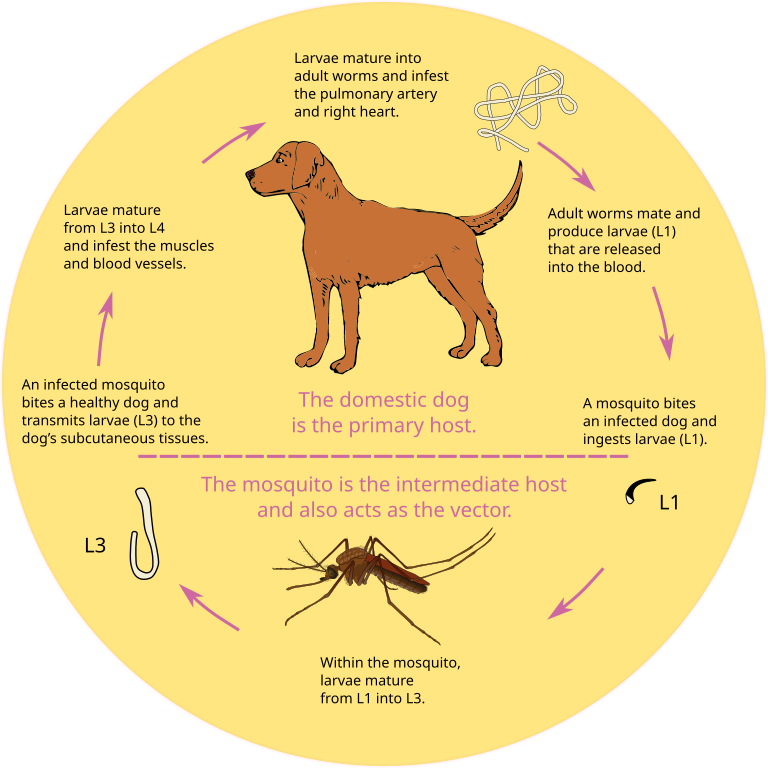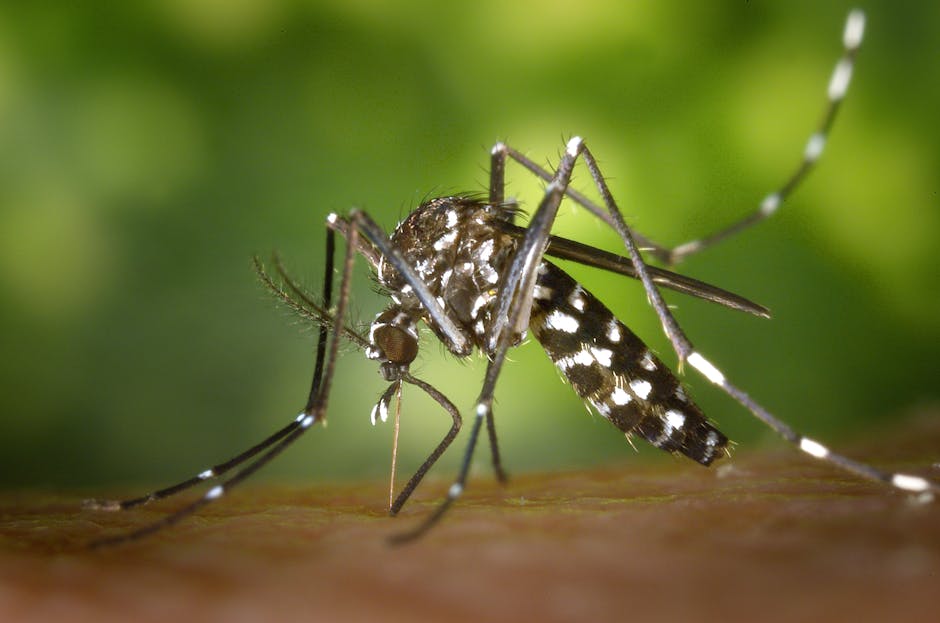Get Educated: April is Heartworm Awareness Month
Posted by Alicia Compton on
Did you know that the month of April is “National Heartworm Awareness Month”? Well, it is. April is the PERFECT month to educate yourself about heartworms. Heartworm awareness is important. Your pet may never step a foot outside. They can still get heartworms.
We all know that Spring brings us beautiful flowers and warm sunshine. But, it also brings us those friends we’re not too fond of. The friends that are part of the creepy crawly variety. This includes our lovely friend the mosquito.
I can’t tell you how many times a mosquito has left their mark on me. My family used to joke that I was a “mosquito magnet”. Honestly, I can’t say that I disagree. It seems like there is just something they love about me. Human blood isn’t the only snack mosquitoes love. They also love to feed on our beloved pets, too.
Mosquitoes are actually the host that transmits heartworms to our beloved pooches.
What Are Heartworms?
According to the U.S. Food and Drug Administration heartworms are a disease. They are caused by a parasitic worm. This worm is known as Dirofilaria immitis. Mosquitoes are where these worms live.
One mosquito bite is all it takes for your dog to get heartworm disease. Adult female heartworms offspring are called microfilariae. This is what adult female heartworms release into your dog’s bloodstream. In as little as 6 months your dog may have full-blown adult heartworms.

Who Can Get Heartworms?
Humans are definitely not immune to heartworms. We can get heartworms from being bit by an infected mosquito as well. But, fortunately, we are not a “natural host” to heartworms. So, the heartworms normally die before they become adults.
Of course we know dogs can get heartworms. Heartworms seem to take the biggest toll on our pups. Not treated, heartworms can live as many at 7 years when a dog is the host.
Cats can also get the disease. But, heartworms don’t survive well in a cat’s body. Their lifespan with a cat host is a bit shorter than with a dog host. Heartworms normally only survive a maximum of 4 years if a cat is the host. Many times, the worms rarely develop into mature adult heartworms.
Heartworms also infect other mammals as well. Mammals such as foxes, coyotes, and wolves.

It’s important to remember that heartworms can ONLY be transmitted by a mosquito. You can not get heartworms from your dog. Your dog can NOT give heartworms to another animal.
What Are The Symptoms of Heartworms?
Like with any disease, symptoms are going to vary from case to case. Regardless, the symptoms for each possible host is similar.
- Lack of energy
- Weight loss
- Rapid breathing
- Difficulty breathing
- A dry cough
- Fainting spells
It’s important to remember that not every animal will display symptoms of having the heartworm disease.
The Effects of Heartworm Disease
Heartworm disease is a scary thing. I worked in a local Georgia veterinary clinic for over 5 years. The disease is very prominent in the southern regions. So, needless to say, there were a lot of dogs who tested positive for heartworms.
This disease is something that is so affordable to prevent. Compare the price of preventing to treating heartworms. If you’re not preventing it, you will end up kicking yourself!
Let’s look past the cost of prevention and treatment. The possible effects of heartworms should encourage you to put prevention at the top of your “to do” list!
- High blood pressure
- Heart failure
- Enlarged heart
- Lung disease
- Organ damage
How are Heartworms Diagnosed in Pets?
Checking for heartworms is a simple procedure. In order to test for the heartworm disease, a veterinarian will collect a very small sample of blood from your pet.
Most veterinary clinics will first view the blood under a microscope. In most cases they’re looking for the heartworms that haven’t matured yet. In about 60% of dog heartworm cases the “baby heartworms” are seen under a slide. Only about 40% of cats with heartworms are found with the babies.

A lot of clinics are also able to run a test, with the same blood sample, at the clinic. The test takes about 10 minutes. These tests are a definite yes or no as far as a heartworm diagnosis goes. They are able to detect the adult heartworms as well.
How Are Heartworms Treated?
Almost every veterinarian I’ve came in contact with recommends a different treatment for heartworms. Most of the time recommended treatment is based on how severe the pet is infected.
At our veterinary clinic we did see quite a bit of cases that had very mild cases of heartworm disease. Most of the times these cases were previously on some kind of preventive. But, during the treatment, somewhere down the line, the owner forgot to administer the prevention.
In these cases the veterinarian I worked for often recommended the “slow kill method”. This method was usually only recommended for cases where the worms hadn’t matured. With the “slow kill method” the pet got a monthly heartworm preventative.

In most cases this method worked just fine. But, there were times where this method didn’t rid the pet of the heartworms. It’s also common for this form of treatment to take as many as 3 years before your pet is free of the disease.
Heartworm prevention is available for cats. Thankfully heartworm infection in cats is usually mild. Because there is no heartworm treatment for cats.
Veterinarians may also recommend the “slow kill method” for dogs who are high energy. As you may know, it’s a little difficult to keep a high energy dog quiet. Well, with the other method for killing heartworms it’s a requirement that your pet is “quiet” during this treatment.
It’s unfortunate but a lot of high energy pups just can’t handle a faster “kill” method. Especially ones who have a high infestation of heartworms. Pets who aren’t able to “keep quiet” during the fast kill method may face severe consequences. Consequences as severe as death.
The “Fast Kill Method” For Treating Heartworms
VetStreet offers a great breakdown of the “fast kill method” over on their website. The first plan of action being something I’m very familiar with.
If a veterinarian recommends the “fast kill method” they may first prescribe an antibiotic. The heartworm positive pet will have to finish the antibiotic. This has to be done before the actual treatment can begin.
This isn’t something I’ve personally seen working in the pet industry. But, VetStreet also states that it’s common for a veterinarian to prescribe heartworm preventative prior to the actual treatment. As well as possibly a steroid prescription prior to treatment.
Once your pet finishes all of the recommended antibiotics, steroids, and preventatives the actual treatment will begin.
This form of treatment takes up to two months. During that two months your pet will visit the veterinarian for a series of injections.
After each injection your pet will be required to stay in the veterinary hospital. Some clinics even require pets who received a treatment to stay overnight. This is to ensure that the injections didn’t cause any side effects.
Cost of Heartworm Treatment
The cost of heartworm treatment varies based on different factors. Cost varies based on location, type of treatment, and the size of your pet.
The “Slow Kill Method” Cost
The “slow kill method” cost is comparable to what you would pay for monthly heartworm prevention. That’s because that’s exactly what you’re doing. You’re slowly killing the worms with a regular, recommended prevention dose every month.
Monthly cost will depend on the monthly preventative you chose and the size of your dog. In almost all cases, the larger the dog, the more you end up spending.
In places where prices are considered lower you may pay as little as $5 a month for heartworm preventative. That’s if, of course, you have a tiny pup. Places that have a higher cost of living may run anywhere between $5-$15+ per month for a small pooch.
Larger dogs will run you a bit more monthly. The monthly cost for the “slow kill method” may run you anywhere between $15 - $40+.
Keep in mind as well, the slower method can take as long as 4 years for full recovery.
So, if you have a Chihuahua your total cost for the slower method may run you anywhere between $240 - $720. But, what if you have a gorgeous, but large Akita? Your cost for the slower method will run you anywhere between $720 - $1920.
This doesn’t include the price of the heartworm test, additional bloodwork, etc.. That is only the estimated cost for the monthly slow kill treatment.
The “Fast Kill Method” Cost
The initial recommended cost for the “fast kill method” may knock you off your feet at first. But, that’s probably only because, more than likely, the slower method is broken down monthly for you. That monthly cost is definitely comforting. Especially when you encounter the total cost for the “fast kill method”.
On most occasions a veterinarian will provide you with a total price for this treatment. That price usually includes all of the below.
- Any antibiotics, prevention, or steroids that need to be given prior to treatment
- Hospital stays that are required
- IV fluids
- Monitoring

Some clinics often factor in the cost of 6 months of prevention for after the heartworm treatment. Keep in mind though, not all clinics offer all of this with their “total price” of treatment. Sometimes that price only includes the injections themselves. Make sure you ask if extra cost are associated with hospital stays, prescriptions, monitoring, etc..
Preventing Heartworm Disease
The first step you’re going to want to take when you get a new dog is to PREVENT heartworms. You will want to research prevention before you research treating the disease. This is because hopefully with prevention you’ll never have to worry about treating actual heartworms. Because, we have all of our paws crossed that your pet will never have to go through that.
The first thing you want to do is have your dog tested for heartworms by a veterinarian. If you have a puppy, it’s recommended you do this by 6 months old. You may have acquired an older dog. If so, it’s important to have him or her tested for heartworms right away.
It’s recommended that all pets are tested for the diseases prior to getting a prevention prescription. The main reason behind this is to protect pets who are positive for heartworms. Certain preventives may cause danger to pets who already have the disease.
You’ll be ready to go once your vet gives you the “green light” to start prevention. Most of time the time your veterinarian will have a great recommendation on heartworm prevention. They’ll be able to give you the best choice based off your certain circumstances.
Finding The Right Heartworm Prevention For Your Pet
Like I clarified above, cats can get heartworms. In most cases though the infection never gets to a harmful point. But, nonetheless, prevention is still available for cats and dogs.
In the United States you MUST have a prescription for heartworm prevention. In order to get this prevention your pet and veterinarian must have a patient-doctor relationship. Meaning that your pet has already had a heartworm test done. As well as already had a meeting with the veterinarian.
There was one complaint I’ll always remember from working at a veterinary clinic. Clients always wondered why we couldn’t refill their heartworm medication. Often they would ensure us, even though their pet hadn’t been tested in years, that their pet is heartworm free. What many clients didn’t understand is that veterinarians and their staff must follow laws. Most laws REQUIRE that a pet has a heartworm test done ONCE a year in order to get a heartworm prescription.
The prevention methods used for heartworms come in two forms. Prevention can be provided as a tablet. It is also provided as a liquid that is applied to the skin.
Some of the prevention available for heartworms is paired as a combination. On top of preventing your pet from heartworms the product may offer other protection. You may get prevention for other worms such as hookworms, roundworms, and tapeworms. Companies have even went as far as creating a prevention that covers heartworms, all other worms, fleas, and ticks.
It’s important to research the possible dangers of the prevention you chose. Just like with human medication, not every treatment option is right for every pet. For example, I know there is one option that isn’t recommended for pets who experience seizures. This is because this certain option has been known to cause complications to pets who suffer from seizures.
More than likely any heartworm prevention you run into will be based on weight. You’ll want to make sure that you find the right size for the weight of your pet.
In the long run it’s going to depend on where you buy your prevention in regards to how you get your prevention. Most heartworm prevention is recommended that you give it monthly. Some clinics offer you the opportunity to buy prevention on a monthly basis. Other clinics will allow you to buy it in a 6 month supply. With some even allowing you to go ahead and stock up on a whole year!
Are you buying heartworm prevention for a puppy? Then I don’t necessarily recommend stocking up on a 6 month or year supply. It’s almost guaranteed that your puppy will grow as the months go by. As I said above, prevention, more than likely, is based on weight. To ensure your pooch is getting proper “coverage” you’re going to need the right dose.
For example, say your puppy is 6 pounds and 7 months old. So, you buy a preventative that is for dogs who weigh up to 10 pounds. But, you want to be prepared. That’s when you decide to go ahead and request a 6 month supply. What if in 3 months your puppy has sky rocketed to a whopping 15 pounds? Then the 6 month supply you bought will no longer be good. It’s recommended dose no longer matches up to your pup’s weight.
Do YOUR Part In Preventing Heartworm Disease
As you know now heartworms are transmitted to our pets by pesky mosquitoes. I’ll be honest with you. It doesn’t seem to matter what we try here in Georgia to rid our surroundings of them. They laugh at our attempts.
The most important thing for you to do is to make your dog’s environment uninviting for them.
I can’t tell you how many times I’ve heard a pet owner tell me there is no way their pet has heartworms. Forget the fact that they haven’t had a heartworm test in ages. This client just knows there’s absolutely NO WAY their sweet pup has this horrible disease.

I’ll be the first to tell you it doesn’t matter if your dog has never touched a paw to the outside. It only takes ONE bite from a mosquito infected with heartworms for your dog to be infected! Mosquitoes are crafty creatures, too. If they want a meal bad enough they will find a way to sneak into your home.
So, what can YOU do to make YOUR environment a little less mosquito friendly? I listed a few great ideas below.
- Citronella products are a great way to deter mosquitoes. But, make sure that you keep the products at least out of reach from your pets. They may keep the mosquitoes away. That doesn’t mean they don’t seem like a tasty treat to your pet.
- Mosquitoes are NOT fans of garlic of chives. If you’re trying to keep these pesky creatures away this may the perfect time to start that garden you’ve been talking about for years. Let the mosquito growing repellant commence!
- These pesky critters are also drawn to water. Especially dirty water that hasn’t been replaced on a regular basis. That’s why it’s common to see a gang of mosquitoes congregating around a swimming pool that hasn’t been serviced in a while.
Keeping your pet’s water bowls clean and free of debris is super important. Not just for their well being. But, it’s also important because it helps keep the heartworm carrying mosquitoes away.
Not all food and water bowls are easy to clean out. Especially if you go a while without dumping them. Our home uses stainless steel food AND water bowls. We used to use the plastic ones. But, our dogs always ended up chewing them up. They definitely don’t try that with the stainless steel bowls.
Stainless steel bowls are also super easy to clean. The gunk comes right off! Plus, they have that modern look to them, too. This makes them perfect for farmhouse decor all the way to super modern home decor.

In order to prevent heartworm disease, you also need to start your pup on a preventative. This needs to be done as soon as your pup is old enough. Most heartworm prevention must be given once a month.
Do NOT slack on giving your pet heartworm medication! Heartworm disease is a potential life threatening disease to your dog. Make sure to give the prevention on the same day, every single month. Unless you’re advised otherwise by your veterinarian.
Share this post
- Tags: Dog bowls, Pet Safety, Pet Wellness









